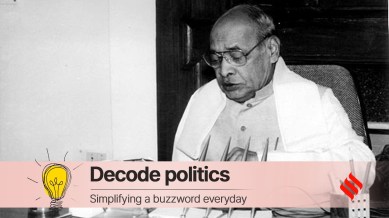Decode Politics: How SC in 1998 came to grant legislators immunity in bribery cases
JMM MPs Suraj Mandal, Shibu Soren, Simon Marandi, and Shailendra Mahto were charged with accepting bribes to save PV Narasimha Rao’s minority government in 1993, when it was dealing with the fallout of liberalisation and Babri demolition.

The Supreme Court on Monday overruled its 1998 judgment that gave legislators immunity from prosecution for accepting bribes to make a speech or cast a vote in Parliament state legislatures.
“The judgment of the majority in Narasimha Rao (case) which grants immunity to legislators has a grave danger and thus overruled,” said a seven-judge Bench led by Chief Justice of India D Y Chandrachud.
monthly limit of free stories.
with an Express account.
In a 3:2 majority judgment, a five-judge Bench in the P V Narasimha Rao v State (CBI/SPE) held that legislators enjoy immunity from criminal prosecution for bribery in matters connected to their speech and votes in Parliament and Legislative Assemblies as per Article 105(2) — which deals with the powers, privileges, of the Houses of Parliament — and Article 194(2) of the Constitution that says no parliamentarian can be liable to “any proceedings in any court in respect of anything said or any vote given by him in the Legislature”.
What led to the JMM bribery case?
The 1991 Lok Sabha elections were held under the shadow of former Prime Minister Rajiv Gandhi’s assassination. Having lost power in 1989 under the Bofors scam cloud, the Congress scraped through in the 1991 elections. It emerged as the single-largest party, winning 232 of the 487 seats it contested, falling well short of the majority mark of 272. P V Narasimha Rao then became the party’s surprise choice to become the Prime Minister, heading a minority government.
Challenges marked Rao’s tenure, the biggest being the economic crisis that threatened the macroeconomic stability of the country. The 1991 economic liberalisation moves were taken under Rao’s tenure. But the country was also changing rapidly on the political front because of the Ramjanmabhoomi movement, which led to the demolition of the Babri Masjid on December 6, 1992.
These two monumental issues went on to become the basis of a no-confidence motion against the Rao government. The CPI(M)’s Ajoy Mukhopadhyay introduced the motion on July 26, 1993, during the Monsoon Session. The Lok Sabha then had 528 members, with the Congress numbers at 251. This meant the party was short by 13 members for a simple majority. The debate went on for three days.
On July 28, the no-confidence motion was defeated by 14 votes, with 251 votes in favour and 265 against. Three years later, came the bribery case.
Who were among the accused?
Ravindra Kumar of the Rashtriya Mukti Morcha filed a complaint dated February 1, 1996, with the Central Bureau of Investigation (CBI), alleging that in July 1993 “a criminal conspiracy” was hatched by Rao and his Congress colleagues Satish Sharma, Ajit Singh, Bhajan Lal, V C Shukla, R K Dhawan and Lalit Suri “to prove a majority of the government on the floor of the House on July 28, 1993, by bribing Members of Parliament of different political parties, individuals and groups of an amount of over Rs 3 crore and that in furtherance of the said criminal conspiracy a sum of Rs 1.10 crore was handed over by the aforementioned persons” to Jharkhand Mukti Morcha (JMM) MP Suraj Mandal.
The CBI went on to register cases against JMM MPs Mandal, Shibu Soren, Simon Marandi, and Shailendra Mahto. At the time, the party had six MPs in Parliament.
What did the Supreme Court say back then?
The judgment quoted the CBI investigation, which said the JMM leaders “accepted illegal gratification to vote against the Motion and, because of their votes and some other votes, the Government led by A-1 (Rao) survived”.
In the verdict, Justice S P Bharucha held: “… no member (of Parliament) is answerable in a court of law or any similar tribunal for what he has said in Parliament. This again is recognition of the fact that a member needs the freedom to say what he thinks is right in Parliament undeterred by the fear of being proceeded against. A vote, whether cast by voice or gesture or the aid of a machine, is treated as an extension of speech or a substitute for speech and is given the protection that the spoken word has.”
Bharucha added, “We are acutely conscious of the seriousness of the offence that the alleged bribe taker is said to have committed. If true, they bartered a most solemn trust committed to them by those they represented. By reason of the lucre that they received, they enabled a Government to survive. Even so, they are entitled to the protection that the Constitution plainly affords them. Our sense of indignation should not lead us to construe the Constitution narrowly, impairing the guarantee to effective Parliamentary participation and debate.”